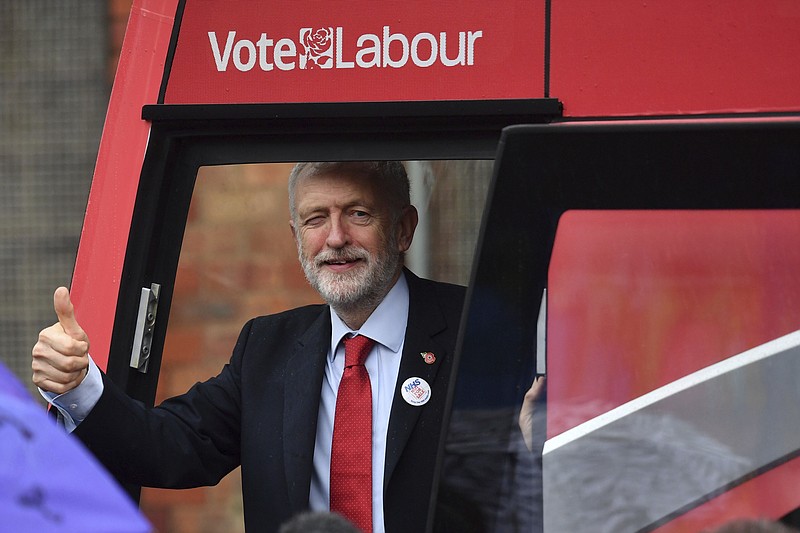LONDON (AP) — The long-festering issue of anti-Semitism in Labour Party ranks is coming back to haunt Jeremy Corbyn in the first days of his election campaign to unseat Prime Minister Boris Johnson and take up residence at 10 Downing Street.
Corbyn’s bid for Britain’s top job was sidetracked Thursday by renewed claims he is not fit to be prime minister because of his perceived tolerance of anti-Semitic attitudes, an allegation Corbyn strongly denied.
The criticism came from a former member of the Labour Party’s inner circle who took the extraordinary step of urging British voters to choose Johnson, and from an influential Jewish newspaper that urged Britons to shun Corbyn in the country’s Dec. 12 general election.
Ian Austin, a close aide to Gordon Brown, the Labour Party’s last prime minister, said the party has been poisoned by “anti-Jewish racism” under Corbyn. Austin was one of seven lawmakers who left the Labour Party in February because of allegations of anti-Semitism and its failure to take a clear stand on Brexit.
On Thursday, he urged “decent, traditional, patriotic Labour voters” to vote for Johnson and the Conservatives rather than let Corbyn take power. He said the “scandal of anti-Semitism” has poisoned Labour since Corbyn was elected party leader in 2015.
Those concerns were echoed by the Jewish Chronicle weekly newspaper, a fixture in Britain’s Jewish community since 1841, which said its polling indicated that nearly half of Britain’s Jews would “seriously consider” leaving the country if Corbyn becomes prime minister.
Over his long career, the 70-year-old Corbyn has stoked controversy by championing the grievances of groups such as Hamas and Hezbollah, and been accused of failing to expel party members who express anti-Semitic views. He has also been criticized for past statements, including a 2010 speech in which he compared Israel’s blockade of the Gaza Strip to Nazi Germany’s sieges of Leningrad and Stalingrad during World War II.
Corbyn denied the allegations, saying Thursday “anti-Semitism is a poison and an evil in our society,” and he was working to root it out of the Labour Party.
“Our party has confronted the issue, we have suspended or expelled members, we have an education program, and all of that has been set up since I became the leader of this party, and we’ll carry on doing exactly that,” he said.
“There are many Jewish people in this country who are members of the Labour Party, supporters of the Labour Party, work with the Labour Party and they do not share the views that have been put forward on the front page of the Jewish Chronicle,” Corbyn said.
The controversy erupted as Corbyn has been trying to focus attention on his party’s economic plans, based on a broad call for social justice and the restoration of social services cut by the Conservatives since 2010.
Corbyn has been dogged by allegations of anti-Semitism since his spectacular rise from the obscurity of Labour’s back benches to the party’s top spot. He has moved Labour sharply to the left and away from the center ground staked out by former Prime Minister Tony Blair, who led the party to three straight election triumphs.
A year before he took the party’s helm, he was widely criticized for attending a 2014 wreath-laying ceremony at a memorial in Tunisia honoring Palestinians whom Israel has linked to the murders of 11 Israelis at the 1972 Munich Olympics.
On Thursday, the Jewish Chronicle took the unusual step of publishing a front-page editorial aimed at “non-Jews” who would not normally read the paper. It said fears were raised when Corbyn became party leader but that some had hoped he would become more tolerant.
“The opposite has happened. The near-total inaction of Mr. Corbyn and the rest of the Labour leadership in dealing with anti-Semites in the party has both emboldened them and encouraged others,” the newspaper said.

